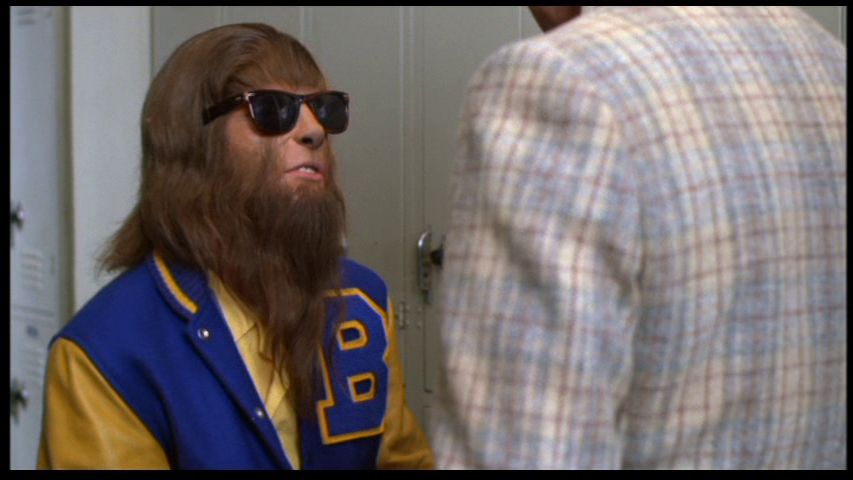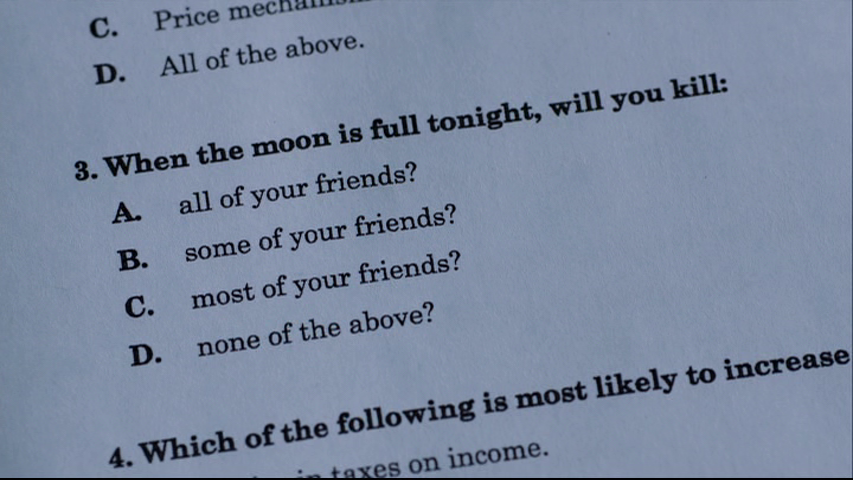There are movies that are essentially vehicles to showcase the star. It’s not a new phenomenon; the Bob Hope/Bing Crosby Road to … series of movies are a good example. Unless the star is more than a flash in the pan, the films become forgettable. When the star has true talent, the movie can transcend the purpose of cashing in on the star’s popularity. In the Eighties, Michael J. Fox broke out during the run of Family Ties, becoming a favourite of audiences. During the show’s run from 1982 to 1989, he appeared as a guest star in several other TV series and TV movies before making the jump to the silver screen with Back to the Future.
Fox, though, didn’t rest. The Eighties were an odd time, where the usual game of Follow-the-Leader played by studios didn’t work. Popular works begat backlash works which also become popular. Fox, though, was bankable, with a natural charm that appears throughout his career, and he was willing to work. He followed up Back to the Future with Teen Wolf, also released in 1985.
Teen Wolf is, in short, an Eighties teen comedy, covering all the problems a teenaged boy would have in the decade – trying to deal with puberty, trying to date the popular girl, trying to deal with bullies, trying to be the team star. The twist, though, is that Fox’s character, Scott Howard, is a werewolf.
Scott has the usual problems. He has a crush on Pamela, played by Lorie Griffin, the popular girl dating the star of the rival basketball team, Mick (Mark Arnold). Scott is on his school’s basketball team, the Beavers, but they’re not a great team. The 5’4″ or 163cm tall Scott is the second best player on the Beavers, and he has problems sinking foul shots. Said foul came from Mick, who tends to bully those he sees as lessers. Scott is also oblivious, not recognizing the crush his friend Boof (Susan Ursitti) has for him. As for puberty, Scott is going through a change even his health class couldn’t help him with. Scott’s best friend, Stiles (Jerry Levine), is there to help, sort of.
The changes come slowly, bit by bit. Fingernails turn into claws and back. Eyes glow. In a pile trying to retrieve a loose ball, Scott growls, sending everyone on both teams back. The changes aren’t all a pain. Scott’s basketball game improves. But the inevitable happens and he changes at a game. Instead of mass panic and a riotous mob, the home team cheers because Scott in his wolf form gives the Beavers their first win.

The usual reactions in a werewolf movie – fear, panic, mobs rising up to strike the lycanthrope down – are avoided. Scott is popular. He’s the star basketball player. He can stand up to the people trying to keep him down. And he gets the popular girl. Technically, she gets him, but only for what she can get from him.
As Scott embraces his wolf side, he starts getting an ego to go with his popularity. He starts alienating everyone, Boof, his teammates. His father (James Hampton), though, gives him The Talk, the lesson on being himself. Turns out, Scott was never bitten. His lycanthropy is genetic. His father is a werewolf. In the championship basketball game, Scott leaves the wolf out, playing as himself, and using his head. Mick, in trying to get Scott to wolf-out, fouls out, his fourth foul on Scott. The movie ends as it begins, with Scott having to make a foul shot.
Outside the supernatural element, Teen Wolf is a very typical teen comedy from the decade. Lycanthropy stands in for puberty, and the goal is laughs. If it wasn’t for Michael J. Fox, the movie would be forgotten. Fox’s natural charm carries the film, giving it more exposure than it would’ve had. As a result, the movie spawned a cartoon series in 1986 and a sequel, Teen Wolf Too with Jason Bateman, in 1987. That should’ve been it, but almost thirty years after the movie’s release, MTV produced a TV series based on the movie.
The TV series, also called Teen Wolf, first aired in 2011 and ran six seasons, ending in 2017. Given that the series has a total run time that is two magnitudes longer than the original movie, changes are expected, just to fill the time. Let’s just look at season one, which covers about the same amount of time in-film as the original movie, from the start of the sports season to city championships.
Tyler Posey takes over the Scott role, now called Scott McCall. Instead of basketball, he plays lacrosse, and wants to make the first line. Stiles (Dylan O’Brien) is still Scott’s best friend, but instead of being the party loving slacker of the movie, he’s more a geek. The popular girl is Lydia (Holland Roden) instead of Pamela, and while she plays up the mean girl aspect, she hides an intellect as she manipulates the lacrosse team captain, Jackson (Colton Haynes), for social position. Scott doesn’t have a crush on her; instead, Stiles does, and he sees through her facade. Scott’s love interest is the new girl in town, Allison (Crystal Reed).
The new series uses today’s expectations of urban fantasy and the supernatural, with Scott being bitten by a werewolf to gain the curse. His transformation happens slowly over the first episode, with him suddenly getting better at lacrosse and making the first line. But with better health and agility comes a few other problems, like anger issues, claws, and fangs. Scott also gains the attention of Derek Hale (Tyler Hoechlin), a werewolf in town trying to find who killed his sister.

Jackson is suspicious of Scott; no one improves that much at lacrosse over the summer. He suspects steroids at first, but digs too deep over the course of the first season. Scott has to juggle his new love life, his friends, Derek, and, new to the series, werewolf hunters. To make matters worse, the leader of the hunters is his new girlfriend’s father (JR Bourne), making the typical problems look tame.
As the season progresses, Scott learns to control his wolf side, tracks down the alpha werewolf who bit him, and finally opens himself to Allison, but several lives are turned upside down along the way. Allison had no idea of her family’s secret until her Aunt Kate (Jill Wagner) shows her. Jackson and Lydia are injured with potentially fatal consequences.
The main difference from movie to TV series is seriousness. The original was a teen comedy. The TV series is a teen drama, but it takes its beats from the movie. The slow reveal of Scott’s abilities, the sports focus in the early part of season one, even the bowling scene from the movie makes an appearance, though altered for who the new characters are. Scott still has his problems, but his ego isn’t one of them. His problems start with typical ones for teenagers, made worse because of his curse. Nothing goes smooth for him. Like Fox’s Scott, Posey’s problems don’t go away when he’s a werewolf.
Season one of Teen Wolf takes the ideas from the movie and brings them to today, with today’s views on urban fantasy and the supernatural. Werewolves are again something the public fears because of the danger they represent. They’re not superstars on the field of play gaining adoration. The TV series is a product of its own time, not of the Eighties, even if it borrows from that decade. The result is the same story, a teenager trying to cope with life and changes, just told in a different way, more serious, with more depth.




